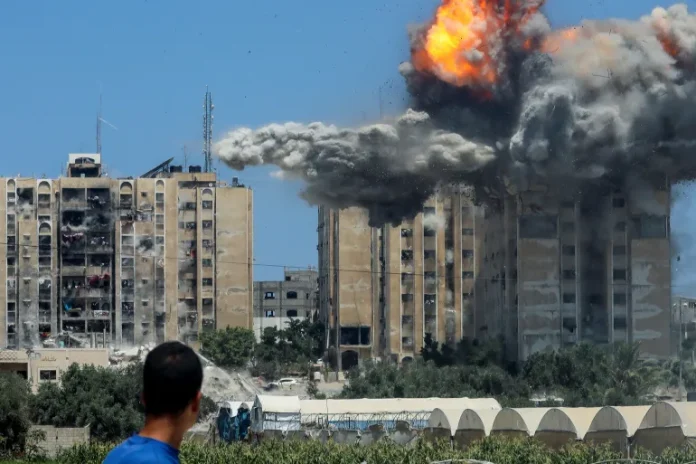The Middle East continues to be riven by crisis: while Israel pursues its military offensive on Gaza, the Arab League discusses developments in Libya and ways to resolve the current conflict.
Fresh Israeli attack kills 20 Palestinians
At least 20 Palestinians were killed in an Israeli bombardment in Al-Bureij refugee camp in central Gaza on Tuesday.
The homes of the Al-Tarturi and Abu Shouk families in the camp were bombed, Al-Arabi Al-Jadeed Arabic service reported. Five people were also killed in an Israeli bombing of a gathering on Salah al-Din Road in the Al-Zeitoun neighbourhood of Gaza City, Palestinian media reported.
US Secretary of State Antony Blinken will travel to Egypt on Tuesday to discuss with Egyptian officials a ceasefire in Gaza and the release of prisoners, the State Department said.
He will discuss efforts to reach an agreement “that will ensure the release of all hostages, alleviate the suffering of the Palestinian people, and help establish broader regional security,” the State Department said in a statement.
The US ambassador to the UN accused the Israeli military of targeting schools, aid workers and civilians in Gaza, signalling growing American disillusionment with its close ally as the first anniversary of the war approaches.
US Ambassador Linda Thomas-Greenfield spoke unusually harshly against the Israeli military at a UN Security Council meeting, saying many of the strikes in recent weeks that have injured or killed UN staff and aid workers “could have been prevented.”
Libyan crisis
The Arab League discussed with the US developments in Libya and ways to resolve the current crisis in the country.
This came during a meeting between Arab League Assistant Secretary General Hossam Zaki and US Special Envoy for Libya Richard Norland, the Arab League said in a statement issued on Tuesday.
After the meeting, Zaki said he reviewed the Arab League’s position and standing principles, among which the preservation of Libya’s unity and territorial integrity comes first, and outlined the League’s efforts and contacts with the parties in recent months.
He emphasised that the Arab League stands ready to support the Libyans in reaching solutions acceptable to them.
For his part, the US envoy spoke about his efforts to resolve the Libyan crisis, stressing his desire to consult and coordinate with the Arab League and to hear its assessment of efforts to reconcile views.
Iranian leader criticises treatment of Muslims
India has lashed out at comments made by Iran’s supreme leader over the treatment of the country’s Muslim minority.
India’s foreign ministry said on Monday that Ali Khamenei’s remarks in a post on website X were “misinformed and unacceptable.” While India and Iran generally enjoy close relations, the Hindu nationalist Indian government’s approach to minorities has been divisive in the past. The statement from New Delhi read:
Countries commenting on minorities are advised to look at their own record before making any observations about others.
The brief message followed Khamenei’s social media post on Monday, which said:
We cannot consider ourselves to be Muslims if we are oblivious to the suffering that a Muslim is enduring in Myanmar, Gaza, India, or any other place.
India and Iran enjoy good relations, as evidenced by strong economic ties. In May, they signed a 10-year contract to develop and operate Iran’s Chabahar port, located on Iran’s southeastern coast.
India is developing the port as a gateway for exports to Iran, Afghanistan and Central Asia, which would allow it to bypass the ports of Karachi and Gwadar in rival Pakistan.
However, Khamenei has in the past been critical of issues concerning Muslims in India and the troubled Muslim-majority region of Kashmir.
Human rights groups blame it all on Modi
Human rights groups have alleged that under Prime Minister Narendra Modi, who took office in 2014, there has been an increase in the mistreatment of Muslims. Since then, attacks on Muslims and their livelihoods have increased in the country. Incidents of hate speech have also increased.
Mob lynchings under the pretext of protecting cows, which some Hindus consider sacred, and the destruction of homes and properties have increased during Modi’s rule.
In March, the Indian government announced rules to implement the Citizenship Amendment Act, a controversial law that opens the path to Indian citizenship for non-Muslim refugees from neighbouring countries.
The Act declared that Hindus, Parsis, Sikhs, Buddhists, Jains and Christians who fled to India from predominantly Muslim Afghanistan, Bangladesh and Pakistan before December 31, 2014 are eligible for citizenship.
The law has been labelled “anti-Muslim” by several human rights groups for not bringing this community under its purview, questioning the secular nature of the world’s largest democracy.
Meanwhile, critics have also accused Iran of discriminating against minorities. A UN report last month said ethnic and religious minorities, particularly Kurds and Baluchis, have suffered disproportionately from Tehran’s crackdown since mass protests in 2022.
